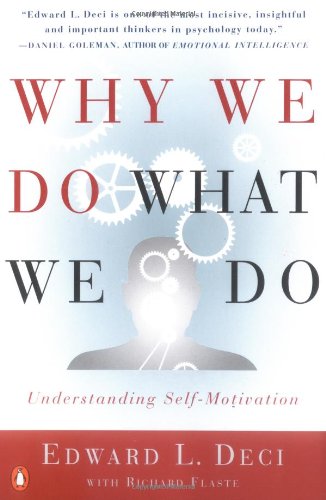
If you reward your children for doing their homework, they will usually respond by getting it done. But is this the most effective method of motivation? No, says psychologist Edward L. Deci, who challenges traditional thinking and shows that this method actually works against performance. The best way to motivate people—at school, at work, or at home—is to support their sense of autonomy. Explaining the reasons why a task is important and then allowing as much personal freedom as possible in carrying out the task will stimulate interest and commitment, and is a much more effective approach than the standard system of reward and punishment. We are all inherently interested in the world, argues Deci, so why not nurture that interest in each other? Instead of asking, “How can I motivate people?” we should be asking, “How can I create the conditions within which people will motivate themselves?”
“An insightful and provocative meditation on how people can become more genuinely engaged and succesful in pursuing their goals.” —Publisher’s Weekly

Extremely Valuable Information If you are a teacher, parent or manager this book has extremely valuable information that will help you make improvements in the manner you relate to your students, children or employees.The book is well written, easy to read, with examples of case studies a layman can easily understand. It was written by a professional but specifically written for the average reader. I found that refreshing. So many professionals write to satisfy their peers that they lose the average reader.Deci advances some ideas that are contrary to the conventional wisdom of getting the most from employees. However his ideas are very compelling and sound.For example, our system of rewards tries to control a person’s behavior. The results of one of the case studies showed that when the rewards were offered with an intent of controlling behavior it sabotaged the desired results.The only motivation that actually works long term is intrinsic motivation. Deci…
A Must Read! This book will be a great addition to any teachers, managers, or parents bookshelves. It explores the psychology of intrinsic (vs. extrinsic) motivation and shows how supervisors, and other people in “one-up” positions, can be more than managers, but true leaders who foster autonomous, authentic growth and responsible decision-making in their subordinates. A must read for anyone who recognizes the lack of responsiblity and accountability in people today and would like to foster positive change in our schools, our companies, and our society.
Humanistic Psychology revisited Few things are harder to understand than why we do what we do. In fact, most psychologists would agree that it is virtually impossible for a person to understand his or her own motivation – and consequently that it is not possible to understand the full scope of motivation of another person. Therefore it would be asking too much from this book to give an answer to the question why we do what we do.